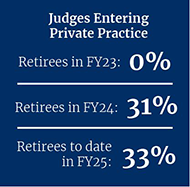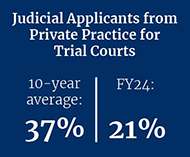About Us
The recruitment and retention of highly qualified judges is essential to the Idaho Supreme Court’s constitutional mission to ensure fair processes and the timely, impartial resolution of cases. Idaho’s system produces quality judges who reflect their communities and uphold the rule of law.
However, recruitment and retention, particularly of district judges, is trending in the wrong direction. Idaho attorneys have repeatedly identified low compensation as a reason they are not interested in becoming judges.
Challenges
Leaving other careers to become an elected judge is different than moving into most other elected roles. The ethical requirements of judicial service reshape every part of a judge’s life. Being a judge becomes their identity — and the last professional job they will ever have.
The stresses of judicial service are having an effect. Judges more often are retiring to go into private practice. Others are declining an interest in judicial service in retirement, previously an uncommon decision.
The professional experience of applicants is narrowing. Civil attorneys in private practice are less likely to apply to become judges — affecting expertise across the bench in areas like regulation and business contracts. The salary gap for these talented civil attorneys is usually larger than in the public sector.
Solutions
The Idaho Supreme Court’s proposed solution is twofold. For FY2026, the Supreme Court requests the salary for a justice be set at $215,000 a year. By statute, that would set the annual salaries for a Court of Appeals judge at $207,000, for a district judge at $201,000, and for a magistrate judge at $193,000. These amounts would help make judicial service more realistic for experienced attorneys.
The Supreme Court proposes creating an independent commission to advise on judicial salaries, patterned after the commission that decides salaries for the Legislature. Salary decisions should be decoupled from debates on policy. The Supreme Court looks forward to engaging with the Legislature on a substantive discussion of judicial recruitment and pay — and to taking up other relevant topics separately.

